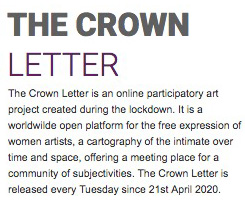Week 118 – October 11 to October 18
Maithili Bavkar

Acrylic and pen on paper, 2021
Manuela Morgaine

– Flag with Iranian young female students in front of their Mollahs – Overlayed drawing, 10/10/2022.
Liza Dimbleby
Letter from Glasgow: Noble Pianos
In March my friend Nadia sent me this video of a bombed out house in Ukraine. I thought it was someone she knew, but it turns out the clip was widely circulated at the start of the war. A woman returns to her house after a bombardment. The first thing she does is to dust down her piano and start to play. As she plays, the other person filming moves the camera about the room and then out through the door and through the house. The camera swings and swoops with the expansive runs of the keyboard, the player’s hands gaining force and confidence with the cadences that ripple out as the camera tracks a trail of rubble and destruction, in every room and down the stairs. At the foot of the stairs the ordered line of shoes by the radiator by the front door is only slightly disrupted. The pair of felt boots with rubber toes have fallen separately — valenki. Valenki, tapki, the ubiquitous out and indoor footwear of Ukrainian and Russian homes. Such lines of shoes are the first things that greet you as you cross the threshold into the private living space. Down the corridor, smashed glass, the washing up still in the sink, a whisk in a milk pan, and below the window, a child’s toy hard hat on the floor with the real rubble. We hear news of bombardment, and we see the cities with their half-collapsed and burnt out buildings, but it is shocking to see the everyday interior, the fine detail of doors and wardrobes and windows, smashed and fallen. To think of this multiplied endlessly — all the rooms, all the sad belongings — shoes, clothes, pictures, chairs and tables, scattered and crumbled.
Click Here to Read More (link to page)
Anne Dubos

Au niveau le plus général, nous suggérons que le care soit considéré comme une activité générique qui
comprend tout ce que nous faisons pour maintenir, perpétuer et réparer notre « monde », de sorte que nous puissions y vivre aussi bien que possible. Ce monde comprend nos corps, nous-mêmes et notre environnement, tous éléments que nous cherchons à relier en réseau complexe, en soutien à la vie.
B. Fischer et J. C. Tronto, « Towards a feminist theory of care », in E. Abel et M.
Nelson (dir.), Circles of Care: Work & Identity in Women’s lives, State University of New
York Press, Albany, NY, 1991, p.40.
